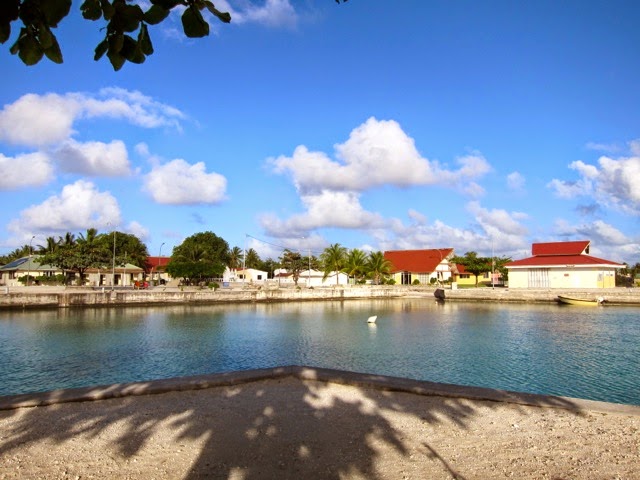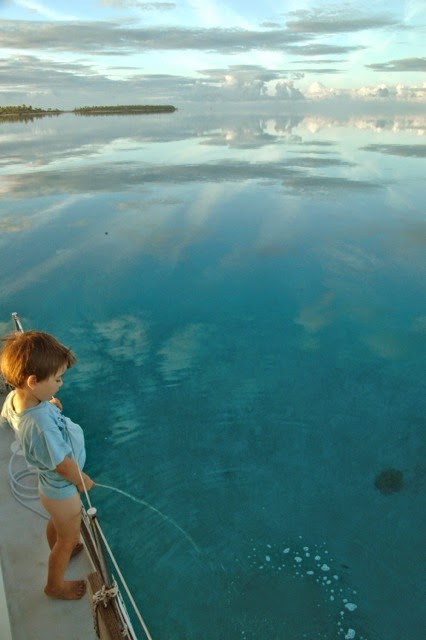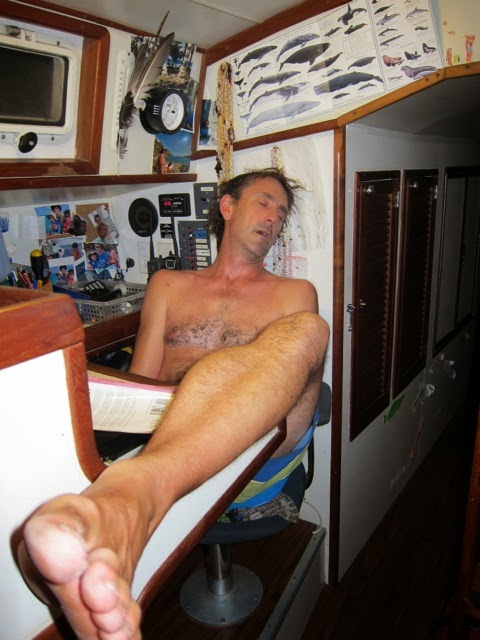In our particular marriage, this nuclear option might be called Playing The Antipodean Card.
Alisa does this now and again to let me know that the double-double demands of playing breadwinning scientist, far-ranging adventurer, loving father and husband and mediocre marine engineer have made me a total pain in the ass to be around.
As in yesterday, when the inanity of trying to make Microsoft Word behave itself while formatting the figures and tables in a five-chapter PhD thesis, coupled with the limits of uploading said thesis (10mb) and pictures for a Cruising World story (25mb) via the donkey-fast internet of Hao, combined with our long stay at the darse de Hao, which would get ever longer until I had everything finished, made me a sullen and grumpy hubby indeed.
So Alisa Played The Card.
"Mebbe we should go back to New Zealand," she said, seeming all innocent and helpful. "Or Iluka. Somewhere where it's easy for you to get things done."
Ha! As if! Living on a boat that's going nowhere seems much much worse to me than living on no boat at all. So I'll redouble my efforts to keep all the balls in the air with my normal smile in its normal position, plastered on my face.
It's the old conundrum - it's a challenge at times to work on the boat, and working keeps me from immersing myself in travel. But it's also the compromise that has kept us going for all these years. And hey - it won't last forever.
In the meantime, I'm able to produce some reasonable contributions to science, even if they do take longer than they would in an office. And the travel has its compensations, like the view of the endless horizon beyond the quai here in Hao, where I am sitting to do my internet.
But enough of all that. This is a post about lunettes.
Lunettes, of course, are eyeglasses in the French-speaking world. In this case, used reading glasses that are collected by the Lion's Club in New Zealand, cleaned, graded, and given to yachties to distribute in out-of-the-way corners of the South Pacific.
Alisa knew a good thing when she heard about it, and we shipped four hundred pairs of reading glasses when we left Whangarei.
She's given "clinics" in Fakarava and here in Hao. The response has been big, as you can see from these pictures (inside the mairie, or town hall in Hao). Eye doctors visit the villages once a year, not everyone can get an appointment, and glasses are super-expensive. She gave away 100 pairs here in Hao - in a village of 1,200 people.
Polynesian culture very readily accepts the idea of gift giving, so it has been (more or less) easy for her to explain what she's about in spite of the language barrier. And reciprocation is a big part of the culture. Flowers enough for leis don't grow in the poor soil of the Tuamotus, so she and her helper, Elias, have returned from these session bedraped in shell necklaces. And people have stopped by the boat later with gifts of coconuts or fish.
 As you might expect, these sessions have given us instant entree into the village scene. Alisa meets the mayor, and a bunch of less notable locals, and we have a bit of context for understanding the village during the rest of our stay.
As you might expect, these sessions have given us instant entree into the village scene. Alisa meets the mayor, and a bunch of less notable locals, and we have a bit of context for understanding the village during the rest of our stay.And these lunette sessions super-charge the travel experience. People stop by the boat at odd hours for glasses, and stay for a long visit afterwards, even if we had had other thoughts for the day. It can be annoying - people ask Alisa to come by their homes when she's trying to care for the kids and it seems they could just come to the boat, or they ask her to replace scratched glasses, or she isn't sure that they really need them at all, and it seems that people are being acquisitive at her expense.
But then she sees someone's face light up when the smudges on a book are suddenly revealed as words, and none of the little annoyances matter a bit.
 Or we meet a particularly sympathetic old fella who comes by the boat for a pair, and he miraculously brings forth the most beautiful Polynesian music from our boys' ukulele, which had remained mute whenever one of us had picked it up.
Or we meet a particularly sympathetic old fella who comes by the boat for a pair, and he miraculously brings forth the most beautiful Polynesian music from our boys' ukulele, which had remained mute whenever one of us had picked it up.












































